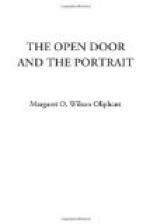“That is true.” He got up and placed himself before the fire, which was very low, as the night was not cold—had not been cold heretofore at least; but it seemed to me now that a little chill came into the dim and faded room. Perhaps it looked more dull from the suggestion of a something brighter, warmer, that might have been. “Talking of mistakes,” he said, “perhaps that was one: to sever you entirely from her side of the house. But I did not care for the connection. You will understand how it is that I speak of it now when I tell you—” He stopped here, however, said nothing more for a minute or so, and then rang the bell. Morphew came, as he always did, very deliberately, so that some time elapsed in silence, during which my surprise grew. When the old man appeared at the door—“Have you put the lights in the drawing-room, as I told you?” my father said.
“Yes, sir; and opened the box, sir; and it’s a—it’s a speaking likeness—”
This the old man got out in a great hurry, as if afraid that his master would stop him. My father did so with a wave of his hand.
“That’s enough. I asked no information. You can go now.”
The door closed upon us, and there was again a pause. My subject had floated away altogether like a mist, though I had been so concerned about it. I tried to resume, but could not. Something seemed to arrest my very breathing; and yet in this dull, respectable house of ours, where everything breathed good character and integrity, it was certain that there could be no shameful mystery to reveal. It was some time before my father spoke, not from any purpose that I could see, but apparently because his mind was busy with probably unaccustomed thoughts.
“You scarcely know the drawing-room, Phil,” he said at last.
“Very little. I have never seen it used. I have a little awe of it, to tell the truth.”
“That should not be. There is no reason for that. But a man by himself, as I have been for the greater part of my life, has no occasion for a drawing-room. I always, as a matter of preference, sat among my books; however, I ought to have thought of the impression on you.”
“Oh, it is not important,” I said; “the awe was childish. I have not thought of it since I came home.”
“It never was anything very splendid at the best,” said he. He lifted the lamp from the table with a sort of abstraction, not remarking even my offer to take it from him, and led the way. He was on the verge of seventy, and looked his age; but it was a vigorous age, with no symptom of giving way. The circle of light from the lamp lit up his white hair and keen blue eyes and clear complexion; his forehead was like old ivory, his cheek warmly colored; an old man, yet a man in full strength. He was taller than I was, and still almost as strong. As he stood for a moment with the lamp in his hand, he looked like a tower in his great height and bulk. I reflected as I looked at him that I knew him intimately, more intimately than any other creature in the world,—I was familiar with every detail of his outward life; could it be that in reality I did not know him at all?




